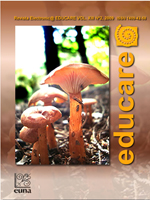El desarrollo de foros estudiantiles como estrategia para fortalecer la enseñanza de la Cívica. La experiencia del Primer Foro Regional de Gobiernos Estudiantiles
DOI:
https://doi.org/10.15359/ree.13-2.5Keywords:
forum, students´ government, civics syllabus, ethics, aesthetics, citizenship participationAbstract
With the implementation of the new Civics Syllabi, new expectations are opened so that the civil education is approached in a more integral way. This will let the teachers explore different techniques to develop their students´ citizenship competences, in order for them to join a society where local, national and global participation allow them to take relevant and committed attitudes. The execution of the Regional Students´ Government Forums is an example on how education contributes to create opportunities for leading students, so that they can have spaces to reflect, give their opinions and offer solutions to the problems that society is facing, and that at the same time, in the future they will be assumed by these students when they have their full citizenship.
References
Cirigliano, G. y Villaverde, A. (1997). Dinámica de grupos y educación. Editorial (21ª Reimp.).
Buenos Aires, Argentina: Editorial Lumen-Humanitas.
Costa Rica. Ministerio de Educación Pública. (2002). Reglamento de la comunidad estudiantil
(aprobado por decreto Nº 30329-MEP). San José, Costa Rica: Autor.
Herrera Castro, L. M. (2008, 30 de julio). Inician plan piloto con nuevo programa de educación
musical. La Prensa Libre, p. 7.
Rodríguez, F. & Rosales, R. (2007). Reflexión sobre ciudadanía para la democracia. Serie Cuadernos
de trabajo, Nº 2007-03, p. 12.
Villegas, J. (2008, 13 de mayo). Colegiales irán a la calle a aprender Educación Cívica. La Nación,
s. p.
Downloads
Published
How to Cite
Issue
Section
License
1. In case the submitted paper is accepted for publication, the author(s) FREELY, COSTLESS, EXCLUSIVELY AND FOR AN INDEFINITE TERM transfer copyrights and patrimonial rights to Universidad Nacional (UNA, Costa Rica). For more details check the Originality Statement and Copyright Transfer Agreement
2. REUTILIZATION RIGHTS: UNA authorizes authors to use, for any purpose (among them selfarchiving or autoarchiving) and to publish in the Internet in any electronic site, the paper´'s final version, both approved and published (post print), as long as it is done with a non commercial purpose, does not generate derivates without previous consentment and recognizes both publisher's name and authorship.
3. The submission and possible publication of the paper in the Educare Electronic Journal is ruled by the Journal’s editorial policies, the institutional rules of Universidad Nacional and the laws of the Republic of Costa Rica. Additionally, any possible difference of opinion or future dispute shall be settled in accordance with the mechanisms of Alternative Dispute Resolution and the Costa Rican Jurisdiction.
4. In all cases, it is understood that the opinions issued are those of the authors and do not necessarily reflect the position and opinion of Educare, CIDE or Universidad Nacional, Costa Rica. It is also understood that, in the exercise of academic freedom, the authors have carried out a rogorous scientific-academic process of research, reflection and argumentation thar lays within the thematic scope of interest of the Journal.
5. The papers published by Educare Electronic Journal use a Creative Commons License:














 The articles published by Educare Electronic Journal can be shared with a Creative Commons License:
The articles published by Educare Electronic Journal can be shared with a Creative Commons License: 



